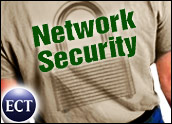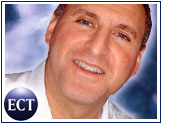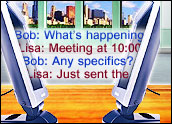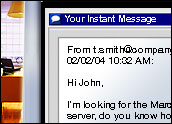
When it comes to developing a presence on the Internet, it takes far more than a catchy or easy-to-remember domain name. While it claims to be the first and largest registrar of domain names on the Internet, Network Solutions is expanding its range of services to meet the demands of both enterprise and small-business customers.
Recently, the Herndon, Virginia-based company launched a country-code Top Level Domains service (ccTLD) that includes extensions from the United Kingdom, Germany, Belgium, Austria, New Zealand and Mexico. Network Solutions expects this service to be valuable to both large corporations looking to safeguard their name and expand their presence in international markets, as well as to local, smaller companies that want to set a toehold on the Internet.
Last summer, Network Solutions unveiled its Certified Offer Service, which helps businesses acquire previously registered domains. The company manages more than 7 million domain names for 3.5 million customers, which range from sole proprietorships to multi-billion dollar conglomerates. The E-Commerce Times recently spent some time chatting with Champ Mitchell, president and CEO of Network Solutions.
ECT: It appears Network Solutions is in a pretty interesting market today.
Mitchell: It’s an area where there’s a lot of change going on. We are reinventing this business, moving it from being totally domain-centric — which it was from its beginning until recently. Domains are a very important part of our business, and the domain-centric buyer is a very important part of our customer base. But increasingly we have in our customer base small businesses who come and get a domain name, simply because they need it as an activating device to do what they want to on the Internet — which is to be found and be able to communicate with their customers. The services we offer enable businesses to use the Internet not just to do business — most of them aren’t doing sales on the Internet — but to be found and to communicate with their customers. Increasingly, we see services that facilitate or enable small businesses to increase their reach [on the Internet] to be the growing focus of our business, even though the domain names and the domain-centric buyers are and will remain very important to us.
ECT: Could you give some specific information on how you’re doing that?
Mitchell: I don’t have permission to use their names, but I can give you my favorite example: two sisters that live in Wisconsin on a farm. They had made a decision that, for their lives, they wanted to continue to be on the farm but, as you know, farming is rough, has low profit margins, and a lot of people fail, so they wanted to find an additional source of income. They decided, not surprisingly since they’re in Wisconsin, to sell cheese. They live in a very rural area, and they didn’t have a way to get their product to market. They didn’t have a way to get their product found, so they decided this Internet thing would be a good way to do it.
They came to us and bought a domain name, a Web site — a very simple, build-it-yourself, five-page Web site that we do by providing templates to people, making it very easy to get started — and some e-mail boxes. They began to sell some cheese, but they didn’t sell enough. They came back to us and said: “We’re not getting found. We’ve got these things now, but people aren’t finding us.”
The common misperception is, if I get a Web site and I have got an e-mail box and you put in “Cheese” in Google, I will show up as the first result.
ECT: Oh, but you’ve got to pay to play, right?
Mitchell: Not necessarily, actually. In a way, yes. There are two ways to be found in search: One is free and the other, of course, is paid. Both are good. We offer people packages that allow them to optimize their ability to be found, both in free search and in paid search. We know how search engines determine rankings, what they look for. We sell a package to people like these ladies that allow them to optimize their Web site being found and being picked up by the free search engines — being listed higher.
They took that and they also bought some AdWords — which are search terms where you get put up on the right side as the paid search results. Then the business picked up dramatically, not surprisingly. Next they came to us and said, “Gee, we’re getting found a lot and we want to increase the products we offer.”
There was a lady who lived down the road who painted milk cans. They started getting little milk cans, having her paint them and, the two women who ran the business, their mother made cheese spread, and they started packing spreads into the decorative milk cans. They came to us and said, “We want to put pictures of these up.” We said: “You need brochureware. You need catalogware. And we have that. We can fix it so it’s right on your Web site, then you can put in pictures of whatever you want.” The sale of those painted milk cans with homemade cheese spread just skyrocketed.
So then, one of them called me and said, “We are now doing so much business that I’m spending half my day pulling credit card numbers off e-mail and processing them.” I said: “There’s a way to do that in an automated fashion right through your Web site. We can sell you a payment gateway, where they fill in all that info. It’ll do two things for you: It’ll let you have automated payment processing. The second thing is, it allows you to have that information from your customer so you can continue to communicate with them. At Christmas time, for example, you can send them an e-mail, saying, ‘Here are the special things we’re selling this Christmas.'”
We actually have a product — called Constant Contact — that does that kind of customer contacting. The ladies’ business has been a huge success. They now run a multi-million dollar business. They have built a small brick factory/warehouse/service center on the farm. They are able to live the lifestyle they want in the place that they want and make a very good income at it.
ECT: That’s awesome. No wonder it’s one of your favorite stories.
Mitchell: That’s the kind of thing we’re trying to do for people. That’s what gets me juiced up. That’s what gets me excited — if we are able to change peoples’ lives for the better because we are able to open up distribution channels that once were closed to small businesses. Small businesses are the fastest growing segment of the Internet. It is for everybody, and it is for us.
Now, having said that, about half our domain names are owned by larger businesses that own multiple domain names. That 10 percent of domain-centric buyers is very important to us. We work very hard to get them the things they need, which are mostly self-management tools for the large inventories they hold. Their needs are very different from small-business people. Small-business people need to have a presence on the Internet that allows them to be found and communicate with their customers. Generally, in the earliest stages, they need some help and guidance into what’s most effective.
ECT: How has this changed your internal structure? Selling to small business can be more consultative, resource-intensive and hands-on than offering self-management tools and domains to enterprises, isn’t it?
Mitchell: Because it is more high-touch, more consultative, it’s more expensive to do. We opened a customer service center about two years ago in Hazelton, Pennsylvania. Our customer satisfaction ratings run from 83 to 87 percent. I’ve been in business 30 years, mostly in consumer products, and this is the highest I’ve seen consistently in customer satisfaction. The reason is we spend a lot of time talking to people. Our folks in Hazelton are wonderful. They really want to help people.
We listen in and sporadically monitor. When you call our Hazelton folks, they really care and they’re really empathetic about the experience the customer may have. If a customer’s having trouble, we start out with the assumption that it’s our fault, that we didn’t make it clear enough, we didn’t make it easy enough. Our customers are very smart people, generally hard-charging folk. What they are not, is they are not technologists. This isn’t their thing. Our view is it’s our job to make this simple, easy and a pleasant experience for you.
The vast majority of our customers — about 60 percent — say when they get on the Internet they see increased sales. A lot of it is just being found. Increasingly, people use Internet search to find goods and services. You can tell this is true by the fact both Google and Yahoo have created a local search. What [users] are looking for generally are local businesses that provide goods and services they need. We want to enable small businesses to be found, to have those channels of distribution they didn’t once have and to provide them with the services that make them more efficient, make their lives easier, make them focus on things they really want to do.
ECT: What about the enterprise?
Mitchell: We treasure our large business accounts. General Electric has over 10,000 domain names with us. We know who runs that business, by name; we talk to her. She is very important to us. The fact is, big businesses like that are pretty saturated.
The number of domains they have under management is pretty constant. They’ll buy a bunch and get rid of a bunch at the same time. There are certain names they protect highly, like ge.com, ge.net, ge.biz, ge.uk, ge.de. Those names they’ll keep forever. They also buy a lot of domains for promotions, as landing pages. They’re not going to renew those, but they’ll buy ones to replace them for another promotion. There’s a little more than half of their base that’s pretty constant, but there’s 40 percent of it that, essentially, churns. If they get rid of 4,000, they get 4,000. They are very valuable customers to us. They’re wonderful customers to deal with. They’re highly professional. And we need to maintain that business: We focus on that every day — trying to keep those customers happy.
If you are managing 10,000 domain names, you don’t want to be calling us, even though for our VIP customers, the phone never rings a second time. What you want is management tools. You do certain things every day. Give me the tools and let me do it. Let me do it in bulk. We have restructured all our tools. The reason we keep these customers is they love the tools.
That’s very different from what the plumber, the electrician or the sisters selling cheese need.
ECT: In effect, you’re running two different companies?
Mitchell: You’re right. We’re running two distinct businesses under a common brand, a common storefront. We provide them different services, different pathways to purchase, different pathways to get service because their needs are totally different.
ECT: So how does this tie into Network Solutions’ new country-specific domain service? Is this for larger organizations, or is it something you’re using to get more of an international presence?
Mitchell: It’s both. It is highly useful for our larger business clients. Many of them want to go into a country and have a presence there. As you can imagine, if you go into Germany there’s a certain amount of national pride. .de is very popular, in fact it’s the second most popular domain in the world now. .com is still the most popular, then .de, then .net, and .uk is not far behind.
You’ve got national issues. You appreciate it if someone comes and adopts the customs and language of the locale. If nothing else, it’s good manners. The same is true on the Internet. If you’re going into Germany, into Italy, into France or into China, you should go in with their presence. Another reason big companies like this is to protect their name. We sell some value-added services that facilitate the use of those things.
Also, we’re seeing tremendous growth in the U.S. right now for small businesses. We’re seeing accelerated growth in Western Europe and certain parts of Asia. We want to be there for those people, also. It is there to help us expand our small business reach. In many of those cases, we do that through partnering. We will provide the domain name and backend, if you will, and have partners with local knowledge.
I get suspicious when I hear people talk about the international market. I’ve never met the international market. I’ve met the U.K. market, the French market. I’ve met Scandanavia as a regional market, but I’ve never met the international market.
ECT: You mentioned customer service as a differentiator. How competitive is this market? Are a lot of other companies doing the same things as Network Solutions?
Mitchell: There are not a lot of other companies doing person-to-person customer service telephonically. There are a few. A couple have copied us. Theirs has not reached the level of ours yet. It is a very important differentiator for us, especially in the small-business market.
There are a lot of people that have begun to replicate our tools for the larger businesses, and a couple of them have done it pretty well. We’re still better, and we work every day to stay ahead, but that is very competitive. On the voice, high-touch, customer service, we’re not alone. There are a couple of other companies that do that. We do it 24 x 7. We do it in eight languages and a total of 12 dialects. In Chinese, we do it in at least two dialects.
ECT: So what are you doing to stay ahead of your competition?
Mitchell: We do a lot more market research and customer studies than the rest of this industry combined. It is vitally important to us to discover what our customers need today and what it looks like they’ll need tomorrow. Nobody else does anything like the amount we do. This allows us to come out with products and services that meet the needs of people as the needs are emerging.
On the small business side, most small businesses want to buy a package of services. Our research allows us to put together combinations of those services that meet the needs of specific segments. What a restaurant needs is very different from what a restaurant needs. It allows us to make a more focused, segmented offering that corresponds to the needs of people and gives them a cost-effective package because we’re not putting a lot of extraneous stuff in there. Obviously, they can come in and talk to our customer service people. Our second-largest sales force is our customer service [division]. As we talk to people and grow our relationship with them, what they buy grows more and more tailored to their specific needs.
That has been a huge differentiator for us. When you’re dealing with small businesses, it is much higher touch. The good news is over time, patterns emerge by business segment and customers become more comfortable talking to us and telling us what they want.
ECT: That’s interesting. So your customer service center is a profit center?
Mitchell: That’s it! Let me tell you, this past year our customer service became a profit center. We think our customer service people are just great. As a matter of fact, I’m driving up to Hazelton, Pennsylvania, from Herndon, Virginia, this afternoon for a pep rally tomorrow. I’m going to give out some awards, because our people are just fabulous.
They’re a great group of people. The one thing I’ve found in 30 years that you can’t fix — and I’ve fixed a lot of businesses — is attitude. These people have the best attitude about truly wanting to help the customer and respecting the customer. It comes through. You hear it. Their motto is: Customer satisfaction with every interaction. We follow up with every interaction with a survey. Any given day, about 15 percent of our people are in coaching sessions.
We’ve got 3.5 million customers, which is not a small thing. We believe there are many services we can offer our customers that they could get — not through the Internet — but we think there are a couple of reasons why we can offer them to customers in a manner that makes them more useful. Number one, there are many products that you can go out and buy, install and use. There are only three problems: If you’re not a professional technologist, deciding which one to pick is not something you’re going to know. It’s not your business. It’s not your job. We look at 100 products every quarter, and on 90-plus percent we take a price because it’s hard to use or it’s not reliable or whatever. We’ll end up doing an offering on maybe seven of them. Out of those, if we find two that are really useful to people and that they want, that’s a good quarter. That’s how we keep on adding products and services.
When you come to us as a non-technologist, the first question is what do I need? What’s best for me? Which one is reliable? Which one has been used by other people in my industry? We help them make that decision. They don’t have to buy that product from us. They can use it and pay for it as they use it.
The other problem with buying it — now you’ve made the decision and picked the right product — is you’ve got to install it. I’m not a technologist. There are a lot of people like me out there, who just aren’t real good with technology. We can make it easy for you to get hold of and easy to use. Third thing, many of these services aren’t really all that easy to use, even though technology-savvy people think they are child’s play. They’re not as easy as people in the business think. We are trying to tell the product people to make products easy to use. Until they do that, we’re there to help people get through it. That way they can get comfortable with it. Small businesses do not have time to sit down and read 120 pages on how to use something. I don’t have that time. They don’t have that time. Not only that, most of that stuff is written so a human being can’t understand it anyway. I’d rather read an insurance policy than a technical manual. Again, we go back to the differentiation being great customer service and the high touch with small businesses.






















































This article is a work of fiction. Network Solutions email fails repeatedly. For weeks in 2005 email was delayed by hours, sometimes days. There is no "Customer Service". We are seeking a new, reliable provider, to host our domain, website and email.